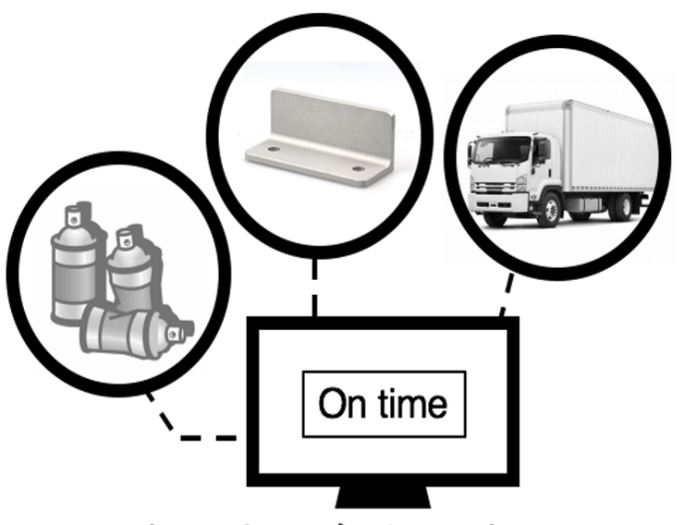什麼是ERP系統?
企業資源規劃(Enterprise Resource Planning,ERP)是一種綜合性的管理軟體,旨在協助企業整合和管理各種業務流程和資源,包括財務、人力資源、供應鏈、生產和客戶服務等,最終更準確的業務運營,提高了競爭力。ERP系統成為公司管理的核心工具,促使員工更好地協作,推動企業實現長期的可持續發展。
為什麼企業需要使用ERP?
沒用ERP的話,企業可能會碰到不少煩惱。
 1. 資訊散亂:
1. 資訊散亂: 每個部門都用不同的系統,資訊散亂在各處,要找一個數據得東翻翻西找。
2. 手工操作多: 很多事情都要手動處理,資料輸入、報告生成,整天就是忙忙碌碌的做些重複性工作。
3. 溝通不暢: 部門之間不夠合作,因為資訊不共享,可能會有生產計劃和庫存管理上的不協調。
4. 庫存困擾: 庫存掌握不准確,可能會有庫存堆積、過多或缺貨的問題,這樣會影響生產和客戶滿意度。
5. 管理盲點: 缺少即時的數據和報告,管理層難以迅速做出明智的決策,對公司整體狀況了解不夠透明。
6. 合規風險: 如果法規標準有變動,可能因為沒有及時更新,企業會面臨合規性風險。
7. 效率低下: 由於沒有自動化流程,工作效率較低,也容易出現人為錯誤,影響企業運營效能。
企業可能會在效率、管理、溝通和風險控制等方面遇到種種困擾,而這些困擾都有可能影響到企業的長期發展。
ERP 的商業價值?
1.提高效率: ERP整合了企業內部的各種業務流程,自動化許多日常操作,減少了繁瑣的手動工。這使得員工能夠更專注於核心業務,提高整體運營效率。
2.降低成本: 通過自動化、優化流程和庫存管理,ERP有助於降低企業的運營成本。有效的庫存管理、生產計劃和資源分配能夠減少浪費,提高資源利用率。
3.即時數據和報告: ERP系統提供即時的、全面的數據和報告,讓管理層能夠更快速、更準確地做出決策。這有助於應對市場變化、調整業務策略。
4.提高客戶滿意度: 透過更好的庫存管理和生產計劃,企業能夠更及時、準確地滿足客戶需求。這提高了交貨準確性,增進了客戶滿意度,有助於保持和吸引客戶。
5.促進合規性: ERP系統有助於確保企業的業務流程符合法規標準,從而降低合規性風險。系統能夠跟踪和記錄相關的數據,使企業更容易遵循法律和行業標準。
6.提高生產力: 通過自動化工作流程,減少手工操作,ERP提高了員工的生產力。員工可以更專注於高價值的任務,提高工作效能。
7.協同合作: ERP整合了各個部門的資訊,促進了跨部門的協同合作。這有助於信息共享,減少信息孤島,提高整體企業的協同效應。
提供您專屬ERP特色及服務
1.基本資料(客戶、廠商、產品)從您的舊系統或EXCEL匯入。
2.建立資料、修改資料方式多樣性。
3.多個模組讓您不用客製化ERP系統的花大錢,就能享有行業別特殊功能之功能,讓您在使用ERP系統的時候,可以輕鬆上手、快速上線。
4.專屬1對1協助導入系統。
5.凱群銷售商品的客戶、凱群自己服務。
Enterprise Resource Planning (ERP) is a comprehensive management software designed to assist businesses in integrating and managing various business processes and resources, including finance, human resources, supply chain, production, and customer service. The ultimate goal is to achieve more accurate business operations and enhance competitiveness. ERP systems have become the core tools for company management, promoting better collaboration among employees and driving long-term sustainable development.
Why do businesses need to use ERP?
Without ERP, businesses may encounter several challenges:
1. Information scattered: Each department using different systems leads to scattered information, making it difficult to find and analyze data.
2. Manual operations: Many tasks require manual handling, such as data entry and report generation, leading to repetitive and time-consuming work.
3. Communication barriers: Lack of information sharing between departments can result in coordination issues, affecting production planning and inventory management.
4. Inventory issues: Inaccurate inventory management may lead to stockpiling, overstocking, or shortages, impacting production and customer satisfaction.
5. Management blind spots: Lack of real-time data and reports makes it challenging for management to make informed decisions quickly, reducing overall transparency.
6. Compliance risks: Failure to timely update systems in response to regulatory changes can expose the company to compliance risks.
7. Inefficiency: Manual processes and lack of automation lead to lower efficiency, increased chances of human errors, and hinder overall operational effectiveness.
Business value of ERP:
1. Improved efficiency: ERP streamlines internal business processes, automating many daily operations and reducing manual workloads, allowing employees to focus on core business activities and enhancing overall operational efficiency.
2. Cost reduction: Through automation, process optimization, and inventory management, ERP helps lower operational costs. Effective inventory management, production planning, and resource allocation reduce waste and improve resource utilization.
3. Real-time data and reporting: ERP systems provide real-time, comprehensive data and reports, enabling management to make faster and more accurate decisions to adapt to market changes and adjust business strategies.
4. Increased customer satisfaction: Better inventory management and production planning enable timely and accurate fulfillment of customer needs, improving delivery accuracy and enhancing customer satisfaction, thereby maintaining and attracting customers.
5. Compliance promotion: ERP systems help ensure that business processes comply with regulatory standards, reducing compliance risks. The system tracks and records relevant data, making it easier for the company to adhere to legal and industry standards.
6. Productivity enhancement: Through automated workflows and reduced manual operations, ERP increases employee productivity. Employees can focus on high-value tasks, ultimately improving overall work efficiency.
7. Collaborative teamwork: ERP integrates information from various departments, facilitating cross-departmental collaboration. This fosters information sharing, reduces information silos, and enhances overall organizational synergy.
Providing personalized ERP features and services:
1. Import basic data (customers, vendors, products) from your old system or Excel.
2. Establish diverse ways to create and modify data.
3. Multiple modules allow you to enjoy industry-specific functionalities without the need for expensive customization, making it easy for you to get started and quickly go live with the ERP system.
4. Exclusive one-on-one assistance in system implementation.
5. Products sold by your company, and services provided by your company.
.jpg)